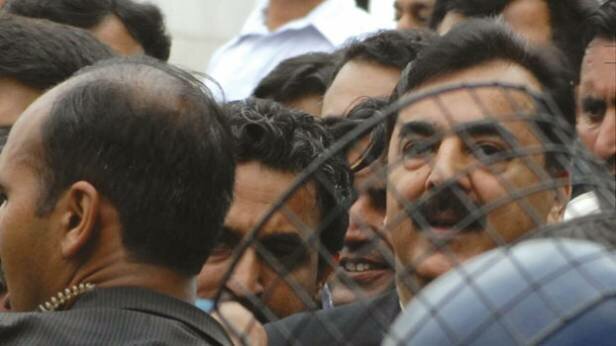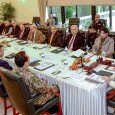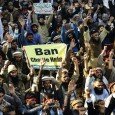By Shahzad Raza –
Contempt. And then some
It was a joke from the get go. Benazir Bhutto, Nawaz Sharif and their top lieutenants signed the Charter of Democracy (CoD) at the palatial London apartment of Rehman Malik. No matter the document reflected honest sentiments of coexistence and mutual respect, the venue seemed to have cursed the agreement. But no one noticed or, perhaps, did not desire to notice. Gone are the days of sweet talk. The CoD has long since been buried. The slogans of “Nawaz-Zardari bhai-bhai” have been long forgotten. Ms Bhutto may be shaking her head in despair in heaven. And the decade of 1990s, with all its palace intrigues, is back to upset the already fragile system.
The first person to blame for the early demise of the CoD is President Asif Ali Zardari, who first declared that the agreement with the PML(N) on the restoration of the judiciary was not a holy scripture. It was a splash in an otherwise peaceful community aquarium where piranhas were learning to coexist with goldfish. Not anymore.Memogate, Mehrangate, Gilani contempt case, Zardari graft case – the rivals have opened so many fronts in the ongoing war to browbeat others.
The optic illusions are not rare when strong sunlight brazenly hit the metal roads of Constitution Avenue. The illusions in minds require no such prerequisites for the people sitting inside the nearby concrete structures.
They just need wild and bizarre imaginations.
Before going any further let’s recall what exactly happened recently. The Supreme Court was annoyed at Prime Minister Gilani of not requesting the Swiss authorities to reopen graft cases against President Zardari. Prime Minister believed (on his own, or under compulsion) that any such request could not be made since the president enjoyed constitutional immunity. The court discarded the argument and convicted the prime minister of contempt charges. He was given the shortest possible imprisonment of less than a minute (inside the courtroom). The short order read the conviction may have led to serious consequences (for the prime minister) under Article 63(1)(g) of the Constitution. The Article deals with disqualification of a parliamentarian on grounds of ridiculing the judiciary or the armed forces.
The prime minister and his legal and political team denied the charges.
All hell broke loose after the judgment. A section of media went berserk, whipping the prime minister with oral and written comments. The villain they were castigating for quite some time had now been condemned by the apex court.
“He is now a convict. He has been disqualified. He has no moral or legal authority to serve as the chief executive of the country,” observed Justice (r) Tariq Mehmood, a known face of the lawyers’ movement.
Barrister Aitzaz Ahsan, another champion of lawyers’ movement – who is thought to have lost all his respect by defending Prime Minister Gilani in contempt proceedings vowed to file appeal against the judgment.
Prime Minister Gilani commented the verdict was not appropriate. Later, during his two consecutive speeches in the National Assembly and the Senate, he challenged the opposition to “come and get him.” He thundered he would continue to hold the office until the question of his disqualification would be settled by the National Assembly Speaker and the Election Commission of Pakistan.
Barrister Ahsan claimed that if the National Assembly Speaker discarded the apex court’s judgment, the matter of Prime Minister Gilani would vanish altogether. However, some senior lawyers believed office of the National Assembly Speaker should act like a post office. It is the prerogative of the Election Commission to declare whether or not Prime Minister Gilani has become disqualified being Member of the National Assembly. Confusion, confusion and more confusion.
“Mr Gilani, you should either leave office or be ready to face a movement,” warned PML(N) Chief Nawaz Sharif. He has invited other opposition parties to join the movement to oust the convicted prime minister.
Meanwhile, Imran Khan has threatened a “tsunami march.” Munawar Hassan of Jamat-e-Islami also uttered similar threats. These were all met with replies. As Interior Minister Rehman Malik said, (with a gesture of his hands, no less) Peoples Party stalwarts were not wearing bangles.
What difference would it make if Prime Minister Gilani resigns or is forced to resign? Is he more than a pawn on the chessboard? Someone else would take his place. The Peoples Party leadership has announced that whosoever replaces Gilani would never write the letter to Swiss authorities to reopen graft cases against President Zardari.
Pakistan has virtually become an arena before a mortal combat where players are sharpening their daggers and tightening the strings of their bows. It is the battle where one can only survive by eliminating others. I wonder if any of them is reading Sun Tzu these days. Nadeem Afzal Gondal is a curious character. He just replaced saber-rattler Chaudhry Nisar Ali Khan as chairman of the Public Accounts Committee. Amid the judiciary-executive confrontation, he summoned the Supreme Court registrar to explain certain financial irregularities in the apex court accounts. He claimed it was long due, but the timings were interesting. Is it deliberate or simple a coincidence?
What Kenzo Tange designed decades ago, the white-marbled architecture (Supreme Court) at Constitution Avenue has been sending shockwaves to the men next door.
Someone says it’s like a wild hungry cat prowling in Zardari’s dovecote. Since things got wary the Constitutional Avenue looks more like famous Broadway, but with real characters and real events. The performances are normally considered spontaneous and unscripted. But who can rule out if fax machines receive late-night or 11th hour handwritten messages on whitepapers from ‘unknown’ numbers.
President Zardari was fortunate enough to find – and cunning enough to entice – new warriors. But they had their own Achilles’ heels. The doyen of lawyers’ movement, Barrister Aitzaz Ahsan, and architect of constitutional reforms, Raza Rabbani, were a pair of aces President Zardari was holding. Against the general perception, Barrister Aitzaz failed to encash the credibility and respect he had earned by driving Chief Justice Iftikhar Muhammad Chaudhry for hours and hours during the lawyers movement.
In this game of poker, the opponents would have equally good cards. They try to read each other and wait for the next card to unfold on the table. Who knows if President Zardari ends up having four of a kind or the contenders get lucky by striking with a straight, if not royal, flush.
So we anxiously wait to hear when someone would finally say: “I am all in.”
The writer is an Islamabad based journalist






























































































